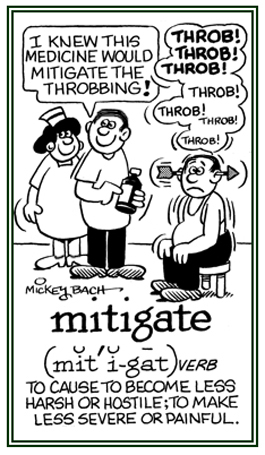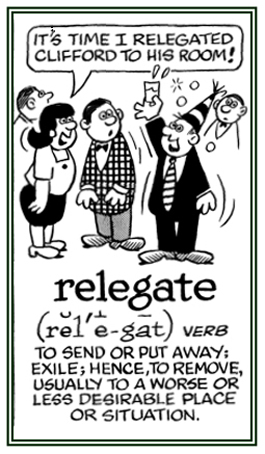-igate, -egate +
(Latin: suffix; meaning, to make, to drive)
instigate (verb), instigates; instigated; instigating
1. To incite or to start a process to begin; especially, to provoke wicked actions: The two drunken teenagers at the party instigated the fighting that occurred that evening.
2. To cause trouble by urging someone to do something destructive, wrong, evil, or bad: Since Tim was usually a timid student, he was instigated, goaded and provoked by the other students to cheat in the upcoming test in order to show his daring and courage.

© ALL rights are reserved.
Go to this Word A Day Revisited Index
2. To cause trouble by urging someone to do something destructive, wrong, evil, or bad: Since Tim was usually a timid student, he was instigated, goaded and provoked by the other students to cheat in the upcoming test in order to show his daring and courage.

Go to this Word A Day Revisited Index
so you can see more of Mickey Bach's cartoons.
1. A smooth, fine powder or paste which was ground up when moist: The worker produced the levigates of a mineral into fine granules with a mixer.
2. Very small particles that have come from coarse ones by grinding them in water: Jim obtained the pulverized granules from the rougher ones by suspending the levigates in a liquid.
3. Something that is flat so it can be polished: The workers had a liquid mixture which was a smooth, uniform liquid composition; such as, a paste or a gel that was a levigate which could be utilized to make the top of the table smooth and shiny.
2. Very small particles that have come from coarse ones by grinding them in water: Jim obtained the pulverized granules from the rougher ones by suspending the levigates in a liquid.
3. Something that is flat so it can be polished: The workers had a liquid mixture which was a smooth, uniform liquid composition; such as, a paste or a gel that was a levigate which could be utilized to make the top of the table smooth and shiny.
litigate (verb), litigates; litigated; litigating
1. To engage in legal proceedings: The company's unwillingness to make a deal increased Mrs.Long's desire to litigate.
2. To institute legal proceedings against someone or an organization; to file a suit against: Those people involved agreed to litigate all disputes in the court the following day.
3. Etymology: from the early 17th century, from Latin litigat-, past participle of litigare, lit-, "lawsuit" + agere, "to drive".
2. To institute legal proceedings against someone or an organization; to file a suit against: Those people involved agreed to litigate all disputes in the court the following day.
3. Etymology: from the early 17th century, from Latin litigat-, past participle of litigare, lit-, "lawsuit" + agere, "to drive".
mitigate (verb), mitigates; mitigated; mitigating
1. To make something less severe, less harsh; easier to bear: The painkiller that Jack took to mitigate or to relieve the soreness of his recent operation was to be taken before going to bed at night.
2. To lessen or to try to lessen the seriousness or extent of something: The science teacher, Mr. Tree, gave the students the assignment to write down ways or means that might mitigate the global warming that was becoming quite serious with time.
3. To decrease in force or intensity: Wrath, grief, harshness, or pain can be mitigated to become moderate again.
4. To make a situation or condition milder or more gentle; to mollify; to appease: to alleviate: The town tried to mitigate poverty by providing free meals at the town hall.

© ALL rights are reserved.

© ALL rights are reserved.

© ALL rights are reserved.
Go to this Word A Day Revisited Index
2. To lessen or to try to lessen the seriousness or extent of something: The science teacher, Mr. Tree, gave the students the assignment to write down ways or means that might mitigate the global warming that was becoming quite serious with time.
3. To decrease in force or intensity: Wrath, grief, harshness, or pain can be mitigated to become moderate again.
4. To make a situation or condition milder or more gentle; to mollify; to appease: to alleviate: The town tried to mitigate poverty by providing free meals at the town hall.



Go to this Word A Day Revisited Index
so you can see more of Mickey Bach's cartoons.
navigate (verb), navigates; navigated; navigating
1. To plan, to record, and to control the course and position of a ship or an aircraft: The pilot and copilot navigated the plane from Frankfurt to Toronto.
2. To give directions to the driver of a vehicle: Jim used his cell phone with a google map to navigate his wife to their destination.
3. To voyage over water in a boat, or a ship; to sail: The children were able to navigate their raft down the slow river to the pier.
2. To give directions to the driver of a vehicle: Jim used his cell phone with a google map to navigate his wife to their destination.
3. To voyage over water in a boat, or a ship; to sail: The children were able to navigate their raft down the slow river to the pier.
obligate (verb), obligates; obligated; obligating
1. To bind, to compel, or to constrain by a social, legal, or moral tie.
2. To cause to be grateful or indebted; to oblige.
3. To commit; for example, money, in order to fulfill an obligation.
4. Etymology: from Latin "to bind by oath", from Old French obligier, from Latin obligare; from ob-, "to" + ligare, "to bind".
2. To cause to be grateful or indebted; to oblige.
3. To commit; for example, money, in order to fulfill an obligation.
4. Etymology: from Latin "to bind by oath", from Old French obligier, from Latin obligare; from ob-, "to" + ligare, "to bind".
relegate (verb), relegates; relegated; relegating
1. To assign to a particular place, an unimportant position, or to an undesirable situation: George has been relegated to a lower paying job because he was unable to produce the profits that he told his supervisor that he would obtain.
2. Etymology: from Latin relegare, "to remove, to dismiss, to banish"; from re-, "back" + legare, "to send."

© ALL rights are reserved.

© ALL rights are reserved.

© ALL rights are reserved.
Go to this Word A Day Revisited Index
2. Etymology: from Latin relegare, "to remove, to dismiss, to banish"; from re-, "back" + legare, "to send."



Go to this Word A Day Revisited Index
so you can see more of Mickey Bach's cartoons.
segregate (verb), segregates; segregated; segregating
1. To separate from others or to set aside from a main body or association: It is considered wrong to segregate disabled people from the rest of society.
During apple harvests, damaged fruit is segregated from the main crop and used for making cider.
2. To impose the isolation of a race or class from the rest of society: Historically, lepers were commonly segregated from the rest of the population because they were thought to be highly infectious, so those who were not contaminated with leprosy segregated the lepers into places away from the other inhabitants.
variegate (verb), variegates; variegated; variegating
1. To change the appearance of, especially by marking with different colors; to streak: Nature is constantly variegating all kinds of flowers with different forms, odors, and various hues and tinges.
2. To give variety to or to include many different things: Sam variegated his working years with several different occupations.

© ALL rights are reserved.
Go to this Word A Day Revisited Index
2. To give variety to or to include many different things: Sam variegated his working years with several different occupations.

Go to this Word A Day Revisited Index
so you can see more of Mickey Bach's cartoons.
<img src="/img/left_arrow_sm.gif" alt="" /> <img src="/img/right_arrow_sm.gif" alt="" />
Showing 1 page of 9 main-word entries or main-word-entry groups.
